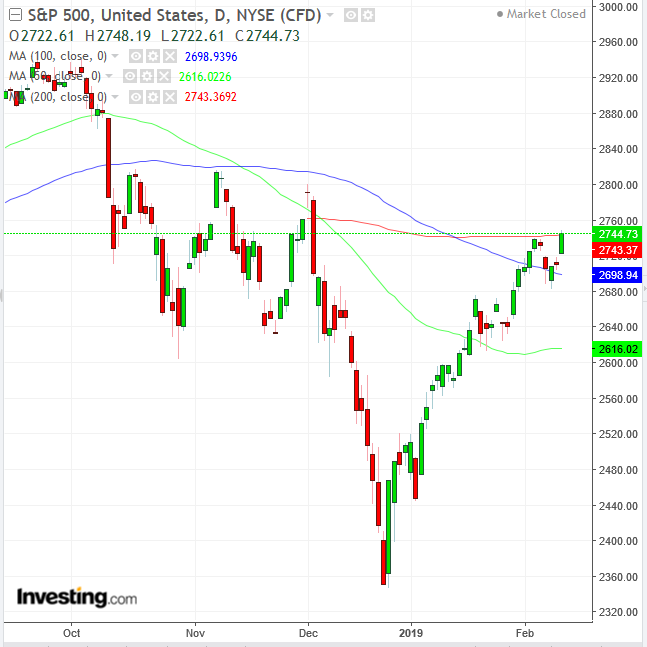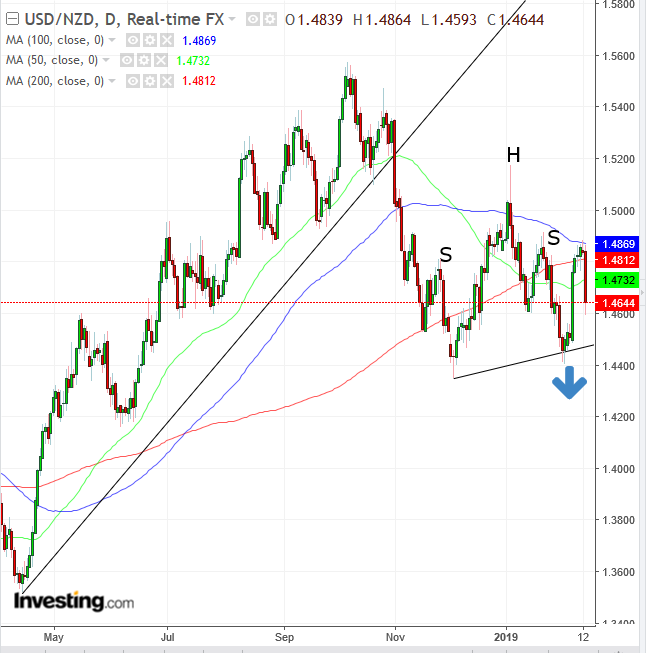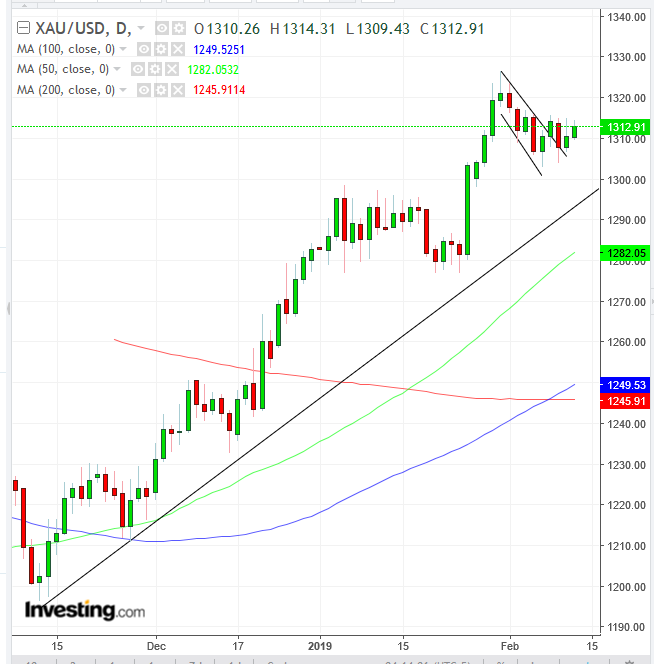- Global stocks, U.S. futures rally on reported U.S.-China trade progress
- U.S. majors seal best performance since early December; export-reliant stocks outperform
- Tailwinds remain unconfirmed: current risk-on trade stands on a house of cards
- Oil keeps surging
Key Events
Global stocks and futures on the S&P 500, Dow and NASDAQ 100 extended a rally this morning after trade negotiations between U.S. and Chinese representatives yielded some positive developments.
The STOXX Europe 600 advanced for a third straight day. Automobile producers led the charge, as investors priced in higher expected exports based on the possible U.S.-China trade deal.
In the earlier Asian session, shares hit their highest level in over four months, with China’s Shanghai Composite (+1.84%), which would be the most immediate beneficiary of a deal, providing the best returns. Japan’s Nikkei climbed 1.34% to mark an eight-week high, while South Korea’s KOSPI gained 0.5%.
Global Financial Affairs
In yesterday's U.S. session investors shook off their malaise, buoyed by optimism over trade negotiations and a tentative agreement among U.S. lawmakers to avert another government shutdown.

The S&P 500 climbed 1.29%, sealing its first meaningful advance after four sessions of either losses or paltry gains. The surge marked the index's most substantial daily increase this month, as well as the first time it closed slightly above the 200 DMA since a one-day stint on Nov. 30. The price reached the highest level since Dec. 3. Materials (+2.24%) outperformed, as a trade resolution would benefit the export-reliant sector. Real Estate (-0.69%) was the only sector closing in the red, which seems counterintuitive if we consider that the recent outlook for slower monetary policy tightening should boost the interest rate-sensitive sector.
The Dow Jones Industrial Average outperformed, posting a 1.49% gain. Similarly to Materials stocks, the industrial index stands to benefit from smoother trade relations, as its listed multinational members would be able to amass greater revenues from lower trade tariffs.
Like the SPX, the Dow jumped the most for the month, also reaching its highest level since Dec. 3. Unlike the S&P 500 though, it stayed clear off the 200 DMA. However, the 100 DMA fell below the 200 DMA last week, providing a negative divergence.
The NASDAQ Composite leaped 1.46%, boosted by FAANG stocks. Similarly to the Dow, the tech-heavy benchmark reached the highest level since Dec. 3 but remained below the 200 DMA.
The Russell 2000 gained 1.08 %. It too hit the highest since Dec. 3, but it is the farthest below the 200 DMA among the major U.S. averages.
Meanwhile in commodities markets, oil extended a rebound from a two-week low after Saudi Arabia pledged to deepen output cuts.
In FX news, the Dollar Index firmed, in line with Treasurys.

The kiwi dollar jumped on an apparent shift from the Reserve Bank of New Zealand to a slightly less dovish stance. The USD/NZD pair is now set to complete a Head & Shoulders continuation pattern.
Pound sterling firmed up as Brexit negotiations resumed ahead of the March 29 deadline to leave the European Union. Prime Minister Theresa May’s chief Brexit negotiator Oliver Robbins was reported saying that Brussels would likely grant an extension on Article 50—rather than conceding a no-deal Brexit. This would in turn imply a long delay on the actual separation process if British MPs don't back PM May's reformulated proposal.

Gold edged higher for a second day—and we believe it will keep climbing—tracking the decline in 10-year Treasury yields. However, the yellow metal slipped slightly below neutral levels in the late European morning. Overall, are investors getting more defensive?
It’s noteworthy that the three key market headwinds that kept investors fretting through to fourth quarter last year—a Fed leaning toward higher interest rates and balance sheet reduction, trade jitters and the U.S. government shutdown—vanished all at once. Or, have they really?
We have already laid out why we think the market reacted prematurely to the Fed’s proclaimed “patience” and “flexibility”, as this dovish turn came in the context of insufficient data due to the government shutdown.
For what concerns trade developments, the market took heart from U.S. President Donald Trump's comments that he will be flexible with the March tariffs deadline if a deal is reached soon. However, we prefer taking an "it ain’t over till it’s over" stance, also considering Trump has been known to change his mind on a dime and often upset his political counterparts with aggressive tones on Twitter.
As to the U.S. government shutdown saga, we'd like to stress that lawmakers have reached “a deal in principle” and that Trump has stated he's "not thrilled" with it—all of which makes a permanent solution on the border wall funding issue far from certain.
In summary, from our perspective this market is standing on a house of cards.
Up Ahead
- Data on Wednesday is expected to show U.S. consumer prices rose 0.1 percent in January, after falling 0.1 percent in December.
- Chinese Vice Premier Liu He is expected to join U.S. Trade Representative Robert Lighthizer and Treasury Secretary Steven Mnuchin in high-level trade talks on Thursday and Friday.
- Sweden’s Riksbank is expected to keep interest rates on Thursday at minus 0.25 percent after the first increase in more than seven years in December.
Earnings
While most of the biggest earnings results of the season have already been published, some reports coming out this week could still impact the broader market:
- Cisco (NASDAQ:CSCO) is due to report earnings after market close today, with an EPS forecast of $0.65, rising from the same quarter last year’s $0.58.
- Coca-Cola (NYSE:KO) is scheduled to announce earnings on Thursday before market open, with a $0.43 EPS forecast, from last year’s $0.49 for the same quarter. Based on the expected results, analysts believe the brand remains a solid dividend stock for long-term investors.
- NVIDIA (NASDAQ:NVDA) is due to release corporate results on Thursday after market close, with a $0.53 EPS, heavily below the $1.57 posted last year.
Market Moves
Stocks
- The Stoxx Europe 600 climbed 0.3 percent, to the highest in a week.
- Futures on the S&P 500 rose 0.3 percent to the highest in more than 10 weeks.
- The MSCI All-Country World Index gained 0.2 percent.
- The U.K.’s FTSE 100 increased 0.4 percent.
- The MSCI Emerging Market Index edged 0.4 percent higher.
Currencies
- The Dollar Index gained less than 0.1 percent.
- The euro slid 0.1 percent to $1.1316. The British pound rose 0.1 percent to $1.2902.
- The Japanese yen dropped 0.2 percent to 110.70 per dollar, the weakest in almost seven weeks.
Bonds
- The yield on 10-year Treasuries fell less than one basis point to 2.69 percent.
- Germany’s 10-year yield decreased one basis point to 0.13 percent.
- Britain’s 10-year yield declined less than one basis point to 1.184 percent.
- Japan’s 10-year yield increased one basis point to -0.006 percent.
Commodities
- West Texas Intermediate crude climbed 0.7 percent to $53.46 a barrel, the highest in a week.
- Gold gained 0.1 percent to $1,311.67 an ounce.
